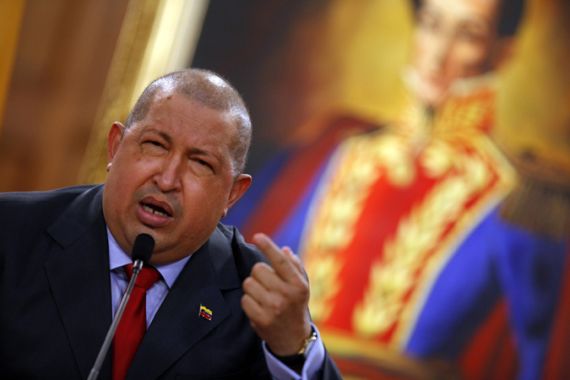US embassy complains in Venezuela: WikiLeaks
Since 2006, US diplomats have claimed that the Venezuelan government harasses them, say WikiLeaks cables.

New York, NY – As Venezuela approaches its presidential election in October, the US embassy in Caracas is surely hoping for a Chavez loss. For years, there’s been a tense standoff between the Chavez authorities and diplomatic staff based inside the embassy itself.
According to secret US diplomatic cables recently disclosed by whistle-blowing outfit WikiLeaks, the Venezuelan government has subjected the Americans to a campaign of harassment and intimidation. Feeling snubbed and smarting under their treatment, US diplomats frequently wrote Washington to complain about the Chavez government.
The complaints go back as far as 2006, when the Americans claimed that the Venezuelan National Guard seized and opened “part of an inbound US Military Group shipment” consisting of “household effects and commissary rations”. According to the embassy, the authorities’ handling of the incident “quickly spiralled out of control, with senior Bolivarian Republic of Venezuela (BRV) officials accusing the United States of wrongdoing”.
The Americans had no idea why the Venezuelans seized the shipment, but noted: “What is clear is that, due to a conscious, high-level decision by the BRV, a historically smooth diplomatic protocol has been compromised and could have lasting ramifications.”
| Inside Story Americas – Venezuela’s voices of opposition |
The Americans believed the incident was hardly random, but rather formed part of a concrete strategy to intimidate the embassy. According to US officials, the Venezuelan Minister of Defence ordered no less than a two-star general out to the airport in the middle of the night to oversee the seizure.
Later, the Minister of Interior and Justice held a press conference and “called out” individual embassy employees, accusing them of “bringing dangerous, even subversive contraband into the BRV under the guise of ‘diplomatic cargo'”.
US ambassador William Brownfield suggested that Chavez had cynical motives in the diplomatic spat. Perhaps, he speculated, the government wanted to whip up public support and use the US as a scapegoat for its own shortcomings.
As part of a “continuing effort”, Chavez might have sought to distract the public from “intractable issues of governance (crime, housing, etc.), where the BRV’s record is poor”, or suggest “nefarious” US motivations like military coup plotting.
Needless to say, if the US harboured an underhanded agenda, then this would hardly be surprising in light of Washington’s anti-Chavez leanings during the Bush years and US assistance to the rightist opposition. To read the cable, however, one might get the impression that the US was a blameless, good-faith operator that had been victimised by an oppressive regime.
The standoff continues
If embassy staff was hoping that tensions would ease after Obama’s election, they were sorely disappointed. In early 2009, Venezuela refused to issue visas to new embassy personnel, including the Defence Attaché and USAID representative. In the absence of a “credible commitment by the GBRV to normalise visa issuance for personnel assigned to Caracas”, the embassy noted, “we should convey to them the potential consequences of continued harassment”.
Such sentiments, US diplomats added, should be “conveyed publicly through the media or by other means”, and “needs to reach President Chavez, as he effectively controls dialogue with the United States”. In the absence of any agreement, Caracas recommended that Washington withdraw permission for Venezuela to maintain its seven consulates in the US.
Three months later, the tensions had hardly abated. In a cable, the US Charge d’Affaires noted that the situation had become increasingly tense when the Venezuelans denied a US official access to a classified diplomatic pouch. When the Chavez authorities insisted on inspecting and X-raying the pouch, a standoff ensued. At long last, the Venezuelans finally backed off and agreed to return the pouch uninspected.
Responding hotly to Chavez officials, the US Charge remarked that “we were no longer in the 18th century and diplomatic correspondence required machines such as computers that would be compromised if they were at any time out of the control of our diplomatic personnel”.
The Venezuelans countered that the US never extended planeside access to foreign diplomatic couriers in the US. Though the Chavez government claimed it was simply “tidying up” its diplomatic procedures, the Americans were unconvinced and suspected that the “action represents renewed efforts to harass Embassy Caracas operations”.
A further cable suggests that, far from improving, the situation continued to deteriorate. By early 2010 the US embassy even requested a “Defensive Security Coordinator”, or DSC, to manage “defensive planning”. The embassy, US officials noted, had a “very unique threat environment”.
It’s difficult to say whether the Venezuelans were as guilty as the Americans claimed. Perhaps, the Chavez government was indeed pursuing a policy of harassment. If so, however, could this really have come as such a surprise to the Americans?
Far from exercising any awareness of their actions, US diplomats had a siege mentality and preferred to think of themselves as victims in a high-stakes political drama. One can only imagine that the Americans are hoping for a Chavez defeat come October, in which case they will be able to unload their precious diplomatic pouches without further hassle.
Nikolas Kozloff is the author of Revolution! South America and the Rise of the New Left, and is the founder of the Revolutionary Handbook.
